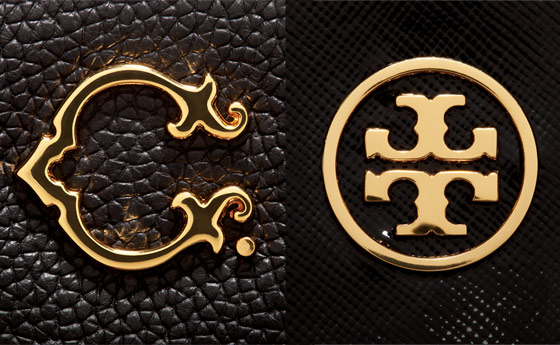
Isn’t it fun?” says Christopher Burch, stepping through the lime-lacquered doors of the Soho flagship of his new store, C. Wonder, and looking out at the candy-colored floor, where customers browse a vast array of merchandise to the songs of sixties girl group the Marvelettes. “This is my music,” he says. “It’s so me.”
There’s a note of paternal pride in his voice. As a venture capitalist and the head of J. Christopher Capital, Burch, who is 58, with white curly hair, crinkly eyes, and a Santa Claus demeanor, has had a hand in launching close to 50 brands, which have provided him with enough wealth that he feels comfortable spending a business day in a down vest, red pajama bottoms, and black velvet slippers. But C. Wonder is his baby, the first property in a long time that he feels is really his. “Look at this stitching,” he marvels, running his hand across a rack of bright button-down blouses and preppy blazers before whirling off to the shoe area, where a huge tufted ottoman awaits suburban princesses who wish to try on the store’s selection of loafers and colorful ballet flats. “See that quality?” he says, bending a ballet flat. “And look: It’s on sale for $39!”
In the home section, where light fixtures shaped like teapots dangle above a display of quirky crockery, Burch picks up a cow-shaped mug. “Now this little item, they didn’t want,” he says, referring to his creative team. “But I actually said, ‘Look at all the moms who come in and want some coffee or Coke or whatever, and the kids want this,’ ” he says, caressing the cow’s spots. “It’s just fun. Isn’t it so fun?”
A curly-haired salesgirl bounces over, her bracelets jangling. “Hey, Mr. B,” she says, beaming.
“Hi, sweetie pie,” Burch says, and they high-five.
“What do you think?” he asks her, as if genuinely wondering. “What do you think it is about this store?”
“I think it has really great energy,” she replies and dutifully goes on about the adjustable music and lighting in the dressing rooms and the spontaneous dance parties the staff encourages customers to join in on, until finally she spins off to complete some task or other, perhaps with the help of cartoon birds.
The point is made: C. Wonder is fun. In fact, it’s so fun, so warm and domestic and full of “Heart”—or “He-Art” as the letters embroidered on Burch’s slippers spell out—you wouldn’t expect it to be the subject of a vicious dispute. Especially not one between this friendly guy who bear-hugs his employees and his ex-wife, designer Tory Burch, a woman the Times recently described as “perfectly perfect.” And yet, this whimsical space has become a battleground where the Burches are fighting a decidedly unusual war over the brand—and life—they built together.
To Chris Burch, C. Wonder is the realization of a long-held dream to provide low-to-mid-price retail in a luxury setting. To Tory Burch, he might as well have erected a giant lacquered middle finger in the front window, directly facing the orange-lacquered doors of her eponymous store a few blocks away. “It’s a rip-off, Tory knows it, and everyone knows it,” says someone we will refer to as a Friend of Tory. “The interior is blatantly plagiarized. Then there’s the snap bracelets. The wallets. The buttons … ”
This is not merely a postmarital dispute between exes. Since their divorce in 2006, Chris and Tory Burch have continued to serve together on the board of what has become a billion-dollar company. Now, he also owns what looks, to some, like a competing brand. “There is some apparent customer confusion between the two brands,” says board member Glen Senk. “And that’s not good for anybody.”
For now at C. Wonder, however, love is in the air. The store has just set up its windows for Valentine’s Day, and Chris Burch points to a sign announcing that customers who find a love note in the store will receive 10 percent off. “See, that’s kind of our vibe,” he says. “I really just want to make women happy.”
This instinct comes not just from the goodness of his He-Art. Catering to women also, as Chris Burch once remarked to a colleague, “makes a shit ton of money.” He should know: He’s been selling to them most of his life. Though he usually remains in the background, you may be familiar with some of his earlier work.
“I designed the first Christmas sweater,” he tells me one evening, while sipping an iced tea in the bar at the Crosby Street Hotel. “They actually got pretty popular. Anyway.”
Talking to Chris Burch is a kinetic experience—he’s always doing things like photographing the whales on the backs of the chairs, or showing you his mineral collection, or saying, “Oh, can you write that down?” to the phalanx of loyal employees who attend to him with filial concern. He has a reputation for being cutthroat, but he doesn’t think of himself like that. “I’m not a business guy,” he says at the Crosby. “I’m a curious creative. And I love collaboration. Creativity, curiosity, and collaborations. Hey, can you write that down?”
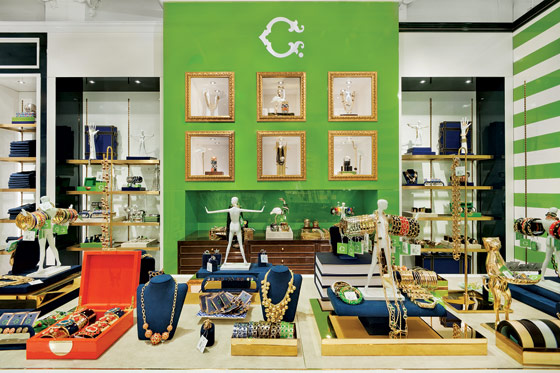
This peripatetic personality made him a great investor but an easily distracted student growing up. On a semester abroad in England, he sweet-talked a Scottish factory into selling him a wholesale order of Shetland-wool sweaters with an eye toward selling them to Wasps in his hometown on the Philadelphia mainline. When the products arrived on the small side, he and his brother, Robert, drove around to colleges, selling to coeds instead. They sold out. Plus, his longtime friend George Corrigan says, “it was a great way to meet girls.”
The brothers quickly ramped up their sweater game. They called their company Eagle’s Eye, after their father’s nickname, and got a post-office box to look official. Then came what Burch calls “probably the most exciting point in my life other than having children and all the other stuff.”
In 1976, at a New York cocktail party celebrating the Bicentennial, he met a guy who told him about a factory in Hong Kong where they made things cheaper and faster than anybody. Burch placed an order for a huge number of sweaters, dirt cheap. Then he put an ad in Glamour and waited. On the eighth day, the postmaster told him he had mail. “And he had behind the desk two big white bags. Like, huge. I put them in the car and drove home to my parents’ house, and I dumped the bags on the floor, and I’m not kidding you, there were probably a thousand checks for sweaters.”
The Hong Kong connection enabled Eagle’s Eye to increase production enough to start distributing nationally and to expand well beyond sweaters. The turtlenecks they festooned with strawberries and whales hit right in time for the preppy craze, and the business took off. Then: “I noticed a lot of our customers were turning into young moms,” Burch says, “and Christmas was very much a family thing …”
Eagle’s Eye opened a New York office in 1981, and on one of his trips there, Burch met his first wife, a fashion consultant named Susan Cole. They had three daughters and moved to a spacious home near his parents in the Philadelphia suburbs. Despite the failure of one of Chris’s more esoteric innovations (“He wanted a sweater with a turkey on it that clucked,” says Leslie Johnson, whom he hired as a designer), business thrived, and in 1989 Chris and Robert began selling their stake in Eagle’s Eye (they ultimately made $60 million).
He bought a small apartment at the Pierre. By this time, Chris and Susan were having problems, and so he began spending more time in New York, ferreting out new business opportunities. “He’ll talk to anybody,” says Corrigan. “He gets his energy, his juice, from people.” One of the people he met was Tory Robinson, a pretty blonde Vera Wang publicist who worked in his office building. Chris and Susan divorced, and in 1996 Chris and Tory were married. Their personalities couldn’t have been more different: Chris was outspoken and disheveled, he once showed up at a dinner wearing his shoes on the wrong feet; Tory, thirteen years his junior, was far more polished. But they both had a certain steely ambition. “Chris wanted to be a player,” says a friend of the couple, “and Tory is shrewd. She’s as shrewd as they get.”
During the Internet boom, he invested heavily in digital properties, made an enormous amount of money before the bubble popped, and parlayed his winnings into an eclectic assortment of businesses: cod-farming, Voss water. She became one of the most photographed blondes on the charity circuit, standing out for her impeccable style and an I’m-not-taking-this-too-seriously smile. The couple had three children, all boys, and renovated the apartment at the Pierre, expanding it to include three suites and a hallway.
It was Tory Burch’s idea to launch her own clothing line. At first, she wanted to revive Jax, the Beverly Hills boutique Jack and Sally Hanson started in the sixties for an elite clientele once described as “two-yacht housewives.” Sally wasn’t interested, so she began sketching her own designs. Her husband helped her raise the money—$10 million from outside investors and $2 million of their own. It was decided that Tory would be the face of the brand. In 2004, Vogue featured her and her now-9,000-square-foot apartment, decorated in “marmalade” and “peridot-green,” in an elaborate spread heralding the launch of her boutique on Elizabeth Street. On opening day, New York’s two-yacht housewives practically ransacked the store. Oprah hailed Tory Burch as the “Next Big Thing.” Virtually overnight, she became a fashion icon.
From all outward appearances, Tory Burch was a model businesswoman, wife, and mother. “Before she leaves on a business trip, Tory writes notes to her kids and hides them around their spacious apartment,” the Palm Beach Post reported breathlessly. But things weren’t so perfectly perfect. While Tory Burch was developing her label, Chris Burch was working on a lower-priced line of his own, Winter & Miggs, which used the same factories to produce similar designs. People familiar with the line say Tory knew about it, that Chris had created Winter & Miggs as a hedge in case Tory Burch didn’t succeed. But Friends of Tory say she only found out when visiting fashion editors commented to her about the line’s similarities to hers and that she was livid.
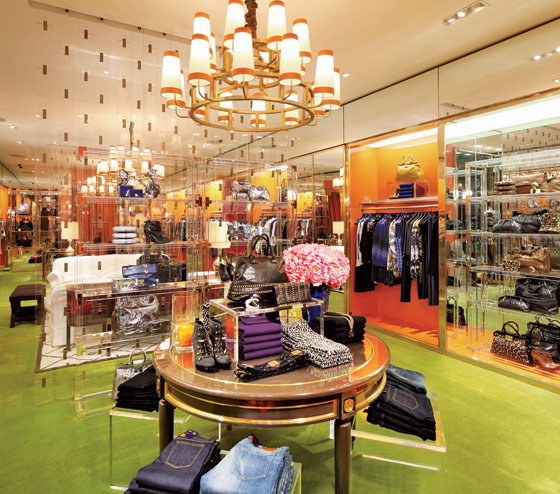
Winter & Miggs never made its mark. But over the years, the same tension resurfaced. Chris Burch continued to push his wife to do lower-price items, and she continued to resist. “What Chris likes is selling to the masses,” says a former employee. “His ex-wife is the opposite.” Their personal relationship was suffering too—Tory was becoming increasingly impatient with her husband’s eccentricities. Two years after the company launched, the couple separated, and Chris moved out of what had once been his bachelor pad. “Chris was pissed,” says an FOT, adding, not unsympathetically, “He had reason to be.”
Despite the tension, Chris Burch held onto his shares and stayed on the board of Tory Burch—the company was doing too well not to. Then Tory Burch started appearing in photographs with Lance Armstrong, and her ex-husband fell into a funk. A Friend of Chris recalls him saying that she was the love of his life. “He had kind of had this golden life. I hate to say it got the best of him. He just got, you know, caught off guard.”
He developed serious health problems: first a herniated disk, then a rare disease that cost him the use of his right arm for months. In 2006, his mother died, and soon after, his father collapsed from a heart attack while dancing at a country club.
There was a silver lining: The tragedies helped heal some of the animosity left over from their divorce. “You realize the pettiness has to stop,” Tory said at the time. “Now we’re putting the business and kids first.”
“We’re like The Bucket List, right, Billy?” asks Chris Burch, who is sitting in the front seat of the Escalade that is being maneuvered through Soho traffic by Bill Allen, his body man of 21 years.
“Yup, we’re doing it,” says Allen, who is a patient man, and not just because of traffic.
The bucket list seems to include world domination. J. Christopher Capital plans to roll out at least six new brands by 2013. There’s C. Wonder, which Burch hopes will open 300 stores worldwide over the next six years; Electric Love Army, a clothing line he’s developing with fashion publicist Kelly Cutrone; Poppin, an online office-supply company; and an as-yet-unnamed clothing company his daughters Alexandra (“Pookie”) and Louisa (“Weezie”) are working on together. The crown jewel of this empire will be “a two-floor, 40,000-square-foot department store that will be beyond your comprehension,” he says, craning around to the back seat. “That’s 99 Christopher.”
“Number Nine Christopher,” says Elissa Lumley, J. Christopher’s director of communications.
“Right, right,” he says. “I’m a little overwhelmed right now with brands.”
Real estate is also a perennial interest. “I also bought an island,” he says, although he doesn’t want to get into specifics other than to say it’s off the coast of Indonesia. (“I think it has like, indigenous people on it,” Lumley says later at J. Christopher Capital’s sprawling new offices on 25th Street. “He’s like, ‘I’ll give all those people jobs!’ ”)
The car pulls up to the Prince Street preview store of another of J. Christopher Capital’s new brands: Monika Chiang, whose namesake may at least be partially responsible for Burch’s new lease on life. He bolts to the back room, where Chiang—a tall, sultry 37-year-old in white jeans, Azzedine Alaïa boots, and a cashmere sweater that exposes a sliver of bisque-colored midriff—is shooting her fall look book.
“This is my girlfriend,” he says, grabbing Chiang by the waist and planting a kiss on her cheek.
“Hi-i-i-i,” she drawls.
Chiang, who sounds like she comes from California even though she was born in New York, met Burch at Dune, a club in the Hamptons that she managed during the summer of 2007.
“Tell the story,” he suggests.
“He came in. He was trying to impress me. And I wouldn’t have it, of course.”
“She has a lot of style, as you can tell,” says Burch. “And I walked up to her knowing quite well she wasn’t in fashion and said, ‘You’re in fashion, aren’t you?’ And we actually dug each other.”
The two now share a townhouse in the West Village when they aren’t in Los Angeles, where Chiang’s flagship recently opened, or in Miami, where Burch maintains a primary residence, or in Shanghai, where Chiang frequently joins Burch on his sourcing trips. That is where the idea for Monika Chiang the brand germinated: At his urging, she had some jewelry made for herself, and one thing led to another. “You never even asked me to do fashion, did you?” Burch asks.
“Mmm-nnnn,” Chiang murmurs.
“I noticed she had a real edge,” he says. Chiang had never designed clothing before, though she told reporters at the opening of her Los Angeles store that “I’ve had a lot of experience shopping.” Her clothes, all leather and fur and high heels that could double as weapons, are as far from Tory Burch as you can get, though their stores on South Robertson Boulevard are just a few doors apart. This has not gone unnoticed by the FOTs. “It’s almost like he’s saying, ’I could put any girl, I could have anybody be the face of it, it doesn’t matter,’ ” says one.
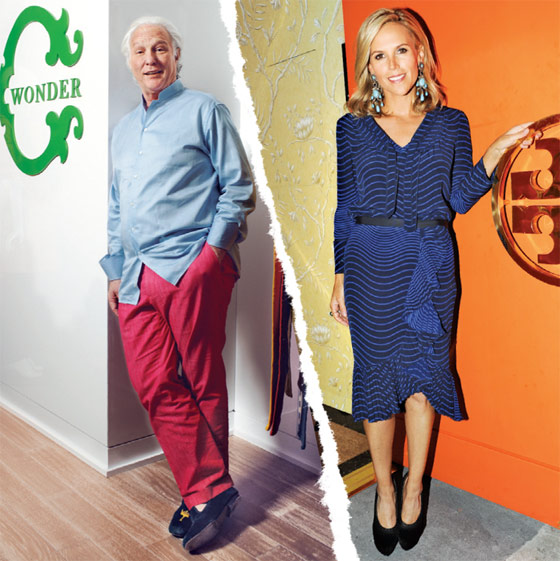
But this was nowhere near as infuriating as C. Wonder. In the weeks leading up to the grand opening, Tory Burch had heard so much about C. Wonder’s likeness to her line that she and her company’s president, Brigitte Kleine, decided to make the trip to Soho themselves. Even after being forewarned, they were shocked. Everything seemed familiar, from the buttons on the blouses to the C logo Chris had emblazoned on all of the items, which they could tell had been created by the same company that designed their double T.
“Tory must have wanted to puke when she went into that store,” says a former employee. “I’m sure she was really hurt.” The FOTs scoff at this notion. “Tory’s beyond the point of being wounded by an ex-husband,” says one. More like furious. Once again Chris had gone behind her back to create a lower-priced brand, and this time it looked like a direct competitor. “It is unclear whether this is an amicable homage or a hostile takeover,” said the Times when C. Wonder opened. “I live in the neighborhood, and the resemblance stopped me in my tracks,” says Susan Scafidi, a fashion lawyer and the head of the Fashion Law Institute at Fordham. “The physical décor and the packaging are like the packaging of a Tory Burch store.”
To Tory Burch, the design and layout of C. Wonder seems like a deliberate attempt by her ex-husband to confuse the consumer into thinking the two brands are associated, à la Kate and Jack Spade. Chris Burch may have held back from using their shared last name, but by appointing himself the figurehead of C. Wonder, he’d all but guaranteed the association would be made in the business press. Which it was. In the weeks surrounding the opening, media coverage invariably noted C. Wonder was the brainchild of “Tory Burch’s ex-husband,” “the chairman of the board of Tory Burch,” or “the man behind Tory Burch.” Most galling to Tory was when Chris, in an interview about C. Wonder on Bloomberg television, referred to himself as “the founder of, and largest shareholder of,” Tory Burch. (Chris and Tory are equal shareholders.) Ironically, the moment occurred in an interview about trademark infringement. “We are constantly having people … stealing our brand name, stealing our products, all over the world,” he told the interviewer.
Everyone at the company knew Chris was fond of exaggeration—the Christmas sweater goes back at least as far as the fifties, by the way—but now FOTs felt he was inflating his role at Tory Burch to promote his competing brand. At the same time, they may be downplaying it. “He doesn’t have a role,” says an FOT, adding that beyond his initial investment, his involvement has been minimal. “That’s bullshit,” says a person with knowledge of both parties, pointing out that Chris’s experience with factories in Asia made him instrumental to production. “Tory has done a brilliant job, but without Chris, it could not have been done. You can’t deny that.” Glen Senk offers a kind of middle ground. “Chris is a founder and a consultant,” he says. “He has a million-and-one ideas, some of which the company has used and some of which the company hasn’t used. There’s a difference—and as a board member I can say this about myself—there’s a difference between throwing out ideas and running a business.”
Friends of Tory say Chris felt sidelined at the company and that may be one of his motivations in opening C. Wonder. “He’s jealous,” says one. “He thinks he didn’t get enough recognition at Tory.” A more impartial observer concurs: “The bottom line is he never got over Tory leaving him.” But it’s hard to imagine that such a massive retail operation, launched six years after a divorce, is motivated primarily by pique. Nor does it make sense that Chris Burch would undercut the company where he is co-chairman. If he’s ripping his ex-wife off, he’s ripping himself off, too.
Friends of Chris say he simply doesn’t see the conflict—that to him the brand is genuinely reflective of the life he has lived. One of the rooms is modeled after a ski lodge he visited in Vail, they point out, another after an English townhouse he owned in the nineties. By this line of thinking, any physical resemblance to Tory Burch could be chalked up to years of living in a peridot-and-marmalade-colored apartment.
“I don’t really get it,” Kelly Cutrone says about the outrage coming from Tory Burch loyalists. “Did they trademark lacquer? Does Lilly Pulitzer start calling Tory and saying, ‘Hey, you’re doing a modernized version of what I used to do, please stop’? Does Yves Saint Laurent call and say, ‘No, I’m the king of the tunic, I lived in Morocco’? Did the Knights of the Templars call off Christian Dior because he was using chain mail and that’s they what wore in the Crusades?”
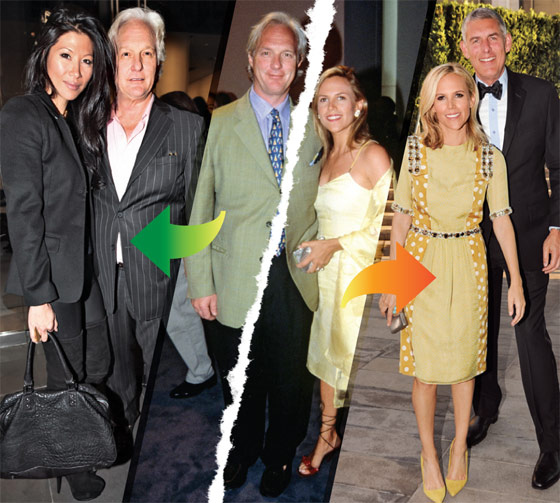
C. Wonder president Amy Shecter, a former Tory Burch executive, notes that the quantity of products the stores carry differentiates them from Tory Burch. “I mean, we have heart-shaped waffle-makers in our store,” she says. “We have pigs that are docking stations.” She starts to laugh. “They don’t have heart-shaped waffle-makers! They don’t have pig docking stations!”
This may not be enough for Tory Burch, who is serious about protecting the exclusivity of her brand. Last summer, a federal court awarded her company $164 million in a suit against online counterfeiters, believed to be the largest judgment ever awarded to a fashion company. A lawsuit against C. Wonder has almost certainly crossed her mind. Given Chris Burch’s position on the board, the company could sue him for breach of fiduciary duty. It is already compiling photographs of C. Wonder products juxtaposed with Tory Burch products in a large binder—a kind of corporate burn book. But suing her ex-husband, the father of her children and the co-chairman of her own board, may be much more trouble than it’s worth for Tory Burch. Since the beginning, she has kept the details of her business private, and a lawsuit of this kind would expose the inner workings of Tory Burch to everyone, including competitors who aren’t relatives. The company would have to release minutes of its board meetings, for instance, at which Chris and Tory were both present—catnip to the fashion gossips who have followed her golden rise. “The family dynamic, or the former family dynamic, will absolutely rivet the consumer,” says Scafidi.
For now, they’re trying to deal with the problem quietly. Barclays Capital has been engaged to help sell off his shares, shopping them at a price that reportedly values the company at an aggressive $2 billion. Meanwhile, Tory Burch has been pressuring her ex-husband to reconceptualize C. Wonder. His daughters from his first marriage, who remain close with their stepmother, are also said to have asked him to make changes.
When I bring this up at the Crosby, Burch deflates like a helium balloon. “I don’t want to talk about that stuff,” he says so miserably that Elissa Lumley reaches out and rubs him on the shoulder. But then he brightens, insisting that he wishes Tory Burch well—both the person and the brand. “I’m so excited by the success of Tory,” he tells me. “I’m so excited by the success of C. Wonder, of Monika Chiang, and of the brands I’ll build in the future.”
Speaking of: He’s due to meet Monika at the movies. “I guess I’m just the luckiest guy alive,” he says as he stands up. “That somehow I get to attract the most exciting entrepreneurs in the world, work with incredible women, and have amazing ex-wives.”
It’s a classic Chris Burch line: cheerful, odd, immodestly modest. The sort of thing that could drive an ex-wife crazy—or make a new partner giddy with anticipation. “Tory Burch was Tory Robinson when she met Chris Burch,” Cutrone points out. “She was a publicist. Now she has a billion-dollar company. I don’t know what the beef is. But I’m hoping he’s able to continue his track record of turning publicists into billionaires, because I’m next in line.”